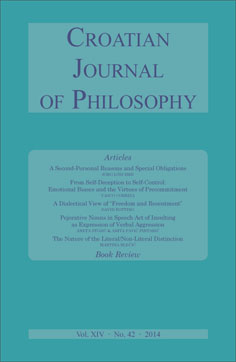The Nature of the Literal/Non-literal Distinction
The Nature of the Literal/Non-literal Distinction
Author(s): Martina BlečićSubject(s): Philosophy
Published by: KruZak
Keywords: Literal, non-literal, metaphor, conversational implicatures, cognitive approach.
Summary/Abstract: In this paper I would like to suggest that a cognitive approach to pragmatics does not lead necessarily to the impossibility of a distinction between literal and non-literal contents and interpretations. If my reading is correct, this approach is focused on the cognitive activities that take place in the minds of regular language users and not on models applied to ideal speaker-hearers. If we accept that, then we should also accept that the distinction between the literal and the non-literal is subjective since different language users will, in certain cases, consider differently a linguistic element in regards to its belonging to the literal or non-literal domain. In order to save this dichotomy we need to return partially to a philosophical approach to pragmatics, that is, we need to establish the distinction between the literal and the non-literal on the basis of generalized objective inferential strategies. The proposal is the following: the presence of implicit or explicit inferential communicational processes (explicit and implicit conversational implicatures, as I refer to them) connected to the literal meaning of the uttered words will be the criterion for the non-literal status of a linguistic/communicational element. By applying objective criteria to the subjective inferential processes of actual language users we can retain both the subjectivity of cognitive differences between individual speakers and the objectivity of the distinction between the literal and the non-literal.
Journal: Croatian Journal of Philosophy
- Issue Year: XIV/2014
- Issue No: 42
- Page Range: 357-375
- Page Count: 19
- Language: English
- Content File-PDF

